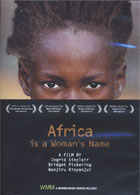
Africa is a Woman’s Name 2009
Distributed by Women Make Movies, 462 Broadway, New York, NY 10013; 212-925-0606
Produced by Transparent Productions
Directed by Ingrid Sinclair, Bridget Pickering, and Wanjiru Kinyanjui
DVD, color, 52 min.
Jr. High - General Adult
African Studies, Education, Gender Studies, Women’s Studies, Zimbabwe
Date Entered: 11/30/2011
Reviewed by Sue F. Phelps, Washington State University, Vancouver, WAThis is a documentary in three parts. Each part is directed by a leading African woman filmmaker and each part tells the story of an African woman who is a powerful force for growth in her sphere of influence. Interviews are interspersed with shots of the landscape, community life and people of each location.
Ingrid Sinclair, an English born filmmaker who studied in South Africa, has received international recognition for her documentaries on the Zimbabwe Liberation Movement. In Africa is a Woman’s Name she documents the annual visit of Amai Rose to her young son and married daughter’s family in Zimbabwe. She is able to visit once a year from her job in South Africa as she was not able to find work at home. This is the story of a mother who is working to see that her children have a better life than she did as a young person. She is proud of her daughter’s choice to wait until she was 29 to marry and is an advocate for her son to get an education and work hard in school.
Bridget Pickering, the daughter of a Namibian diplomat and trade unionist who was educated at Syracuse University, is a filmmaker and producer from Namibia. Pickering directs the story of Phuti Ragohala, a teacher for twenty-one years in a poor rural village, whose life is devoted to raising leaders. She has turned her school into a prize winning public service center during her tenure and is clearly dedicated to the children in her charge and their future. She states, “If I can help one child, I will say I made it.” The interview is interspersed with clips of Ragohala in the classroom, interacting with the children and visiting with her childhood teacher.
Wanjiru Kinyanjui was born in Nairobi, Kenya and studied filmmaking in Berlin, Germany. She is credited with creating Kenya’s burgeoning film culture. Kinyanjui concludes the film with an interview with Njoki Ndang’u, a human rights defense attorney and member of Kenyan Parliament who seeks to improve the safety and future of all Kenyan women. She created the first law against sexual violence and states that though there is race, class and ethnic discrimination in Kenya the most serious is gender discrimination. She is working to remove cultural and social barriers for young women through her influence in parliament and by teaching them they have an option to be educated and succeed professionally. Njoki Ndang’u was the 2006 United Nations Person of the Year.
All three segments of this film are high technical quality and have English subtitles when needed. It is a recommended addition to high school and college libraries to support programs in anthropology, African studies and women’s studies.